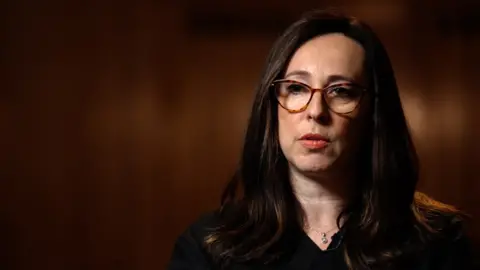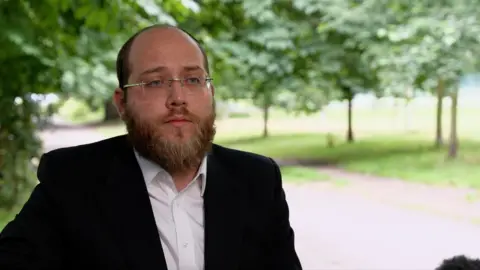'My husband refused a divorce for nine years'
 BBC
BBCRifka Meyer was 32 when she entered into a religious marriage. Two-and-a-half years later, she became what is known among orthodox Jews as a "chained wife" - trapped in a religious marriage with a man who refused to let her have a divorce.
"You feel hopeless and you feel very alone," she tells BBC Newsnight. "You feel like you're screaming and not being heard."
It would take her nearly 10 years to get a religious divorce. But more than 100 women from the Charedi Jewish community remain trapped in religious marriages in the UK, according to Labour Peer Jonathan Mendelsohn, who is part of a cross-party parliamentary group that formed to help them.
"The thing that has shocked me [is] that I alone have been contacted by people since I raised this issue," he says. "Tens of cases, tens of cases, including a number of people in the Jewish community in which I live."
Under orthodox Jewish law, the husband must grant his wife a document called a "get" in Hebrew. Without this, worshippers believe she remains married to him even if they are legally divorced. The women stuck in these religious marriages are known as Agunot, or "chained wives".
Ms Meyer says it meant she was not permitted to have another partner.
"You're stuck. I can't even think of meeting anyone, or dating or moving my life forward because I am stuck in this corner without a view and I just can't go anywhere from there," she says.
"There's not enough communication and support to help you through it. You feel very desperate and very alone. It's a very lonely journey to go through."
Ms Meyer, who lives in London, finally received her get last year. She now runs a charity called GETT Out to help women who are in the same situation.

What happens if a get is refused?
- The woman is forbidden from getting married again as it is considered adultery
- She is also not allowed to have children with anybody else. If she does, the child is labelled a "mamzer" or an estranged person
- If the man is seen as being pressured into giving the get, the Jewish Court - called the Beth Din - rules the divorce invalid

An amendment to the statutory guidance under the Domestic Abuse Act now says that withholding a get can be a form of domestic abuse. If it is deemed controlling or coercive behaviour, the man could be charged and, if found guilty, imprisoned.
Ministers hope the change will give women more power to complain to the authorities about their former partners for not granting a religious divorce.
But the Federation of Synagogues, a group representing orthodox Jews, says any get "given under duress, whether due to physical threats, financial threats or the threat of imprisonment, is absolutely invalid" under Jewish law.
"The couple would remain married to one another, notwithstanding the granting of a get," it said in a letter.
The federation added that any woman using the provisions of the Domestic Abuse Act will have "tied... the hands" of the Jewish court, as "clearly the husband in such a situation will be acting under duress".

Eli Spitzer, a headteacher who is part of the orthodox Jewish community in London, says some rabbis believe that women seeking help under the legislation "would start a process which is then irreversible".
"The husband is no longer in a position to grant a divorce or to give the divorce to his wife out of free will because obviously he faces prosecution, and therefore what the rabbis are saying [is] this has undermined what a Jewish divorce is all about, that it has to be given out of free will," he says.
But Lord Mendelsohn, who is Jewish, believes there is no clash between religious and non-religious law, and questions the motives of the rabbis who say there is.
"They've chosen to create a conflict where none really exists. And I don't know why that is, I suspect [it] is because they feel they're losing control of parts of the process," he says.
"But in any situation where a religious minority exists in a democracy, you have to balance these things... I think they really have to get a grip of the situation and come to realise that this is Britain, this is Britain in 2021."
Some worshippers have told Newsnight they believe the Torah did not intend for women to feel stuck in unhappy marriages. But there is concern among some in the orthodox community that secularism is overriding religion, wiping away centuries of deep-rooted tradition and law practised by millions.
Ms Meyer says that while the amendment to the guidance under the Domestic Abuse Act helps women, it is necessary to "work with the rabbis as well".
"The women feel desperate and they'll take whatever they can get in order to achieve their get," she says. "It's a lifetime of these women being stuck in a marriage that's dead."
